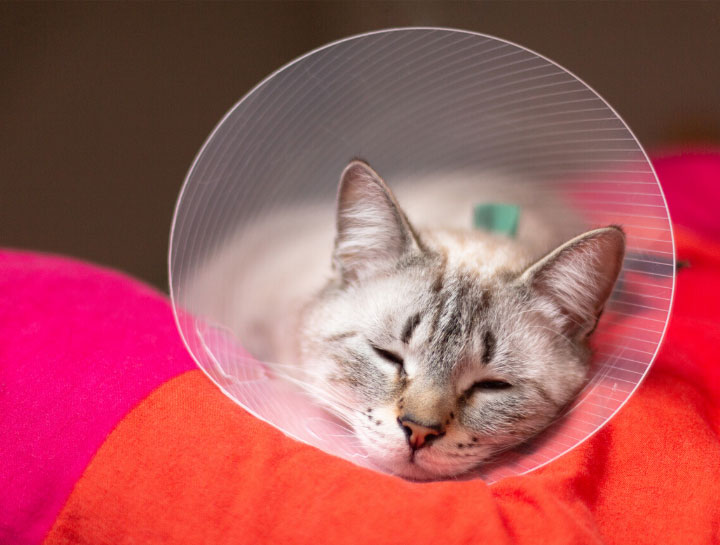Spay & Neuter Procedures
Help your pet live a long, healthy life.
Deciding whether to spay or neuter your cat or dog can be a difficult decision for some pet owners. Although the thought of your pet having surgery may seem scary, we’re here to assure you that spays and neuters are common surgeries that are safe, simple, and generally quick.
How can my pet benefit from sterilization?
Spaying and neutering help pets live long, healthy lives. Having pets sterilized while they’re young reduces their likelihood of developing certain infections and cancers. Plus, it combats overpopulation which, sadly, leads to the euthanasia of pets who cannot be placed in good homes.
Other common issues that spaying and neutering help prevent include:
- Expensive and potentially life-threatening uterine infections are called pyometras. Luckily, they’re 100% preventable if your pet is spayed.
- Cancerous mammary tumors can spread to other parts of the body. If you spay your female pet prior to her first heat cycle, you’ll significantly reduce the likelihood that she’ll develop tumors.
- Testicular cancer and infections can lead to malignant or benign swelling of the prostate.
- Unwanted behavioral problems such as aggression, territorial marking, and roaming.
What happens when a pet is spayed or neutered?
Pets are placed under general anesthesia to perform spay and neuter procedures.
Both procedures are performed through small incisions used to remove certain reproductive organs. After a spay or neuter, the incision is closed with sutures and the patient rests in a recovery ward until they are ready to go back home with you!
After surgery, your pet may be required to wear a special collar designed to prevent them from chewing their sutures for several days. It’s likely they’ll appear sleepy or groggy after surgery, and you might notice redness, swelling, or a little bit of blood surrounding the surgery site. That’s normal. If you become concerned about your pet’s health or behavior following surgery, call your veterinarian to let them know. Your pet's doctors will see to it that all your questions are answered and that your pet is back to normal in no time.
Spaying
Spaying your pet has many benefits. The procedure, which prevents female animals from becoming pregnant and reproducing, can help your dog or cat live a longer, healthier life. Spaying will not change your pet’s personality.
By spaying your female pet, you’re protecting her against potentially deadly diseases, including bacterial infections, reproductive tract diseases, and several types of cancer. You also won’t have to worry about her going into heat. This means avoiding the mess that often accompanies the heat cycle in female dogs and the pacing and crying that happens with female cats. In addition, spaying your pet will help control the dog and cat overpopulation problem, keeping more animals out of shelters.
Spaying, which involves removing the ovaries and uterus, is a surgical procedure and does need to be performed with the pet under anesthesia. We follow strict protocols and continually monitor your pet’s vital signs to help ensure her safety. Please see the descriptions under Anesthesia and Patient Monitoring for more information on what we do to keep your pet safe.
Neutering
Neutering your pet has many benefits. The procedure, which prevents male animals from reproducing, can help your dog or cat live a longer, healthier life. Neutering will not change your pet’s personality.
By neutering your pet, you’re reducing or eliminating his risk for prostate and testicular cancer, as well as sexually transmitted diseases. Neutering will also reduce or eliminate undesirable and embarrassing behavior, including roaming, fighting, humping, and spraying. In addition, neutering your pet will help control the dog and cat overpopulation problem, keeping more animals out of shelters.
Neutering, which involves removing the testicles, is a surgical procedure and does need to be performed with the pet under anesthesia. We follow strict protocols and continually monitor your pet’s vital signs to help ensure his safety. Please see the descriptions under Anesthesia and Patient Monitoring for more information on what we do to keep your pet safe.
To set up an appointment to have your pet neutered or to learn more about this procedure, please call or visit our clinic. If you are struggling with the decision of whether to neuter your pet, please call us or stop by so we can discuss your concerns.
If you have questions about getting your pet spayed or neutered, or you’d like to schedule an appointment, give us a call at (519) 253-7204 or request an appointment online.

